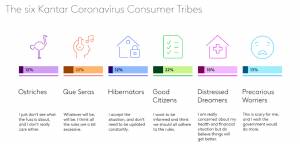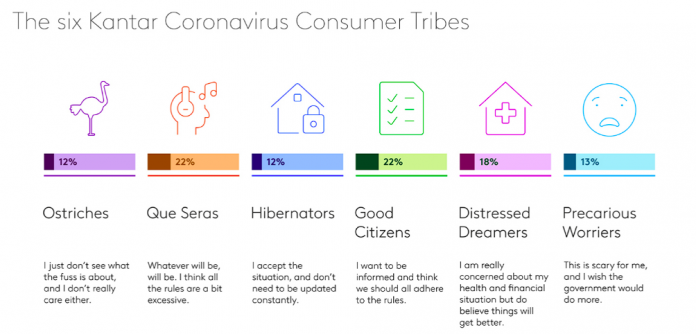Kantar states that governments around the world are slowly reopening societies and economies, but in South Africa we are still facing the eye of the Covid-19 storm.
Although shops, restaurants and cinemas are re-opening, many of us are reluctant to get back to our old way of life. While 50% of us are keen to get back to work in the next month or go to the hairdresser, more than half of us want to delay sending our children back to school, visiting a restaurant or travelling, because of concerns about our own or our loved ones’ safety. Instead, like people all over the world, we are taking an alternate route, preferring to forgo the liveliness of restaurants, cinemas and gyms and stick to the safety of homemade meals, streamed movies and living room workouts for the moment.
Understanding the six distinct consumer tribes can help marketers to reshape their messaging, consumer experiences and even their innovation plans to drive recovery. Wave six of Kantar’s Covid-19 Barometer, which has interviewed more than 150,000 consumers in over 60 markets worldwide across six waves, finds that only 25% of South Africans are keen to bounce back to our old way of life as soon as possible, and 2/3 of us remain concerned about social distancing and avoiding busy places.
The basic Maslowian needs around safety and security remain unmet and until people are ready to climb the pyramid to the next level, economic recovery may stagnate. But brands can play a positive role with the right knowledge — providing the signals of hygiene and safety that encourage people back into the marketplace.
Pandemic tribal affiliations
People are tribal. Different things bring people together: kinship, ethnicity, culture, politics or ideology. For example, in South Africa, we have the growing Curly Girls South Africa movement, dedicated to nurturing natural hair for the best possible version of those natural waves, curls, kinks and coils. We are also home to Harley Davidson Riders in SA, dedicated to riders who relish that twin-motor growl and sharing rally news. While these two groups possibly represent opposite ends of the population spectrum – though there is certainly some overlap – the tribally affiliated individuals within them are apt to share common beliefs and behaviour, and this is key.
Kantar research has identified six distinct coronavirus tribes defined by the levels of worry that they are experiencing, their information consumption about the virus, how conscientiously they adhere to the rules and their trust in government. The segmentation helps brands better plan, communicate, engage and innovate in ways that will encourage people with empathic understanding, and entice them to interact with brands in ways that will shorten the path to economic recovery.

This segmentation informs a perspective of how each tribe responds differently to stress and adversity, empowering businesses to better navigate the consumer environment in the near and longer term. The tribes have been created in 18 key markets around the world including South Africa, Kenya and Nigeria.
Not only are the six Kantar coronavirus consumer tribes different according to how they respond to the pandemic, they also differ in their attitude to travel, how and where they shop, their financial attitudes and behaviours and their tendency to make big plans. While Ostriches are keen to get back to their old way of life as soon as possible, including travelling, going to the cinema and attending large events; Precarious worriers are much more cautious – they are very conscious about continued social distancing, avoid busy places, and will delay engaging in most of their old behaviours.
Tribes are transitional to growth
As lockdowns loosen globally, it is important that marketers meet people ‘where they’re at’, along their personal journeys towards resuming life. Like the distinction between focusing on what you take out of the product box to treat your tresses as a Curly Girl to letting your mane fly behind you on that Harley, Kantar’s research mirrors the polarising differences observed in modern societies in the opposing sentiments of the Precarious worriers and the Ostriches.
But taking the middle road for marketing will not work to bridge the divide between these two groups. Rather, acknowledging and working with people’s differences in beliefs, attitudes and behaviour is essential to effective marketing, particularly when many are feeling stressed and disconnected, while others are not. With this understanding, businesses can work to effectively encourage re-engagement and foster the return to economic growth.










